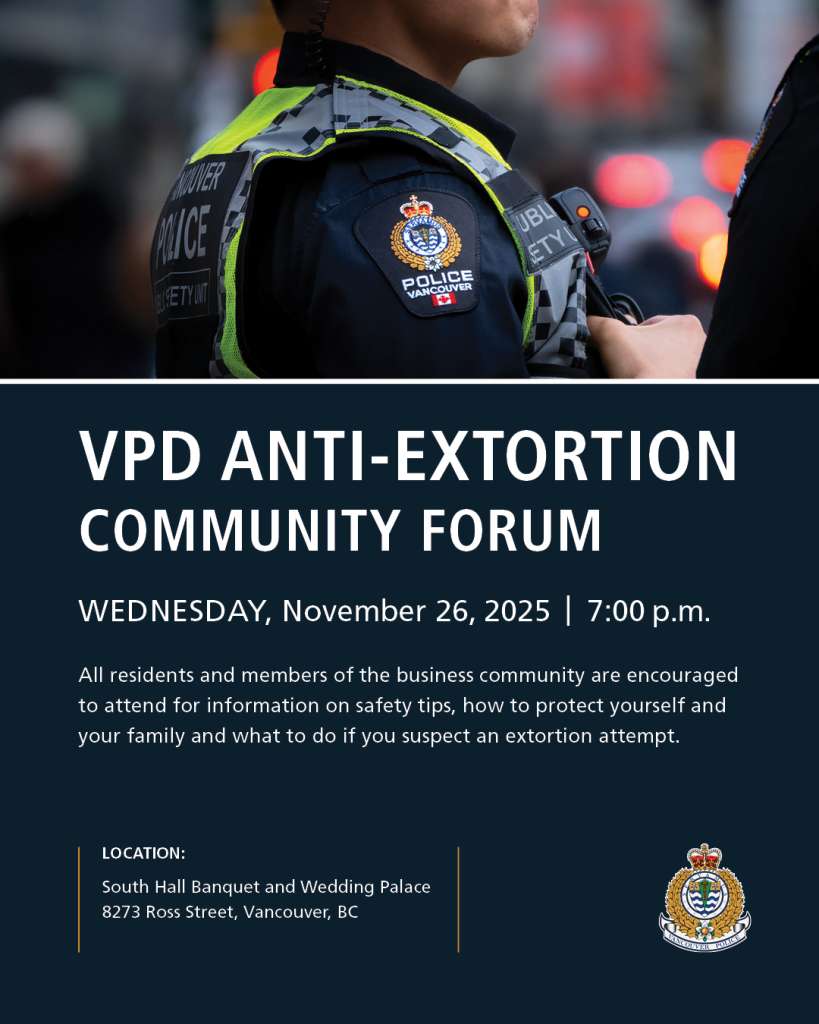Using intimidation, threats, or violence to coerce someone to do—or not do—something is extortion, a serious crime in Canada. While extortion incidents remain rare in Vancouver, cases have been increasing in some Lower Mainland communities. We recognize the concern this creates, and we are taking proactive steps to raise awareness.
Anyone can be targeted, though recent incidents have disproportionately affected business owners in the South Asian community.
Along with our skilled investigators and patrol officers, we work closely with partner agencies—including the Combined Forces Special Enforcement Unit (CFSEU), Canada Border Services, and police departments across the region—to support extortion investigations. We also rely on strong community support networks such as our community policing centres, Business Improvement Areas (BIAs), and our Diversity, Community and Indigenous Relations staff, who provide ongoing outreach and engagement.
All residents and members of the business community are encouraged to attend a VPD Anti-Extortion Community Forum on Wednesday, November 26, 2025 at 7:00 p.m. at the South Hall Banquet and Wedding Palace, 8273 Ross Street, Vancouver. We’ll share information on safety tips, how to protect yourself and your family, and what to do if you suspect an extortion attempt.
Types of Extortion
Threats may be delivered by text, WhatsApp, phone call, letter, or in person, demanding so-called “protection” payments. These individuals may threaten you, your family or your reputation. They may also threaten to damage or destroy your home or business.
Prevention Tips
-
Contact the police immediately – translation services are available
-
Protect your personal info – don’t share sensitive details online
-
Use separate emails and phone numbers for business and personal
-
Limit social media posts about incidents – advise family and friends to do the same
-
Preserve any physical evidence, such as security camera footage or damaged property
-
Save all threatening messages, texts, voicemails, and social posts
-
Allow calls from a blocked or unfamiliar number to go to voicemail
-
Boost security – consider cameras and better lighting at home and work
-
Join Block Watch and report suspicious people, vehicles, or activity
-
Share tips with police – any information may help
-
Visit your local community policing centre for guidance and support
-
Do not pay or negotiate
Resources
These scams often begin with an unsolicited text or email containing a link designed to steal your information or money through threats. The message may claim you’ve won something, or suggest the sender knows what you’ve been doing online. Clicking the link can trick you into sharing personal information or downloading malware. In some cases, criminals can take control of your device and demand a ransom to restore access.
These messages may also include a password you’ve used in the past—usually obtained through large-scale data breaches—to make the threat seem more credible. Offenders may then attempt to blackmail you by threatening to share false or embarrassing information about you with your family or friends.
Prevention Tips
-
Use strong, complex passwords and change them regularly
-
Use different passwords for each account – consider a password manager to keep them secure
-
Install and update anti-virus software on all devices
-
Never click links in unsolicited emails, texts, or messages
-
Ignore suspicious messages – do not reply, click links, or download attachments
Resources
Criminals often target people through dating apps or social media, using fake profiles to befriend you. They may persuade you to share intimate images, then threaten to share them with others unless you send more images or pay money.
Sextortion can also occur if a criminal hacks your account or creates realistic deepfake images or videos of you.
You are never to blame for sextortion. If this happens to you, please contact the police—we are here to help.
Prevention Tips
-
Keep your follower and friend lists private
-
Never share sexual images or personal information that makes you uncomfortable
-
Be cautious of fast-moving relationships or early sexual messages from someone you just met
-
If targeted, stop all communication immediately – do not pay or send more images
-
Do not delete your social media account – you can deactivate it so police can still access evidence
-
Save any evidence – screenshots, messages, videos, or photos (you can still report the incident even if you don’t have these)
Resources
Canadian Anti-Fraud Centre
How to Report
If you feel your immediate safety or the safety of others is at risk, please call 911.
Otherwise, you can call 604-717-3321 to make a police report if you live in Vancouver.
If you have information about an extortion, please call your local police. In Vancouver, you can also call your local community policing centre.


